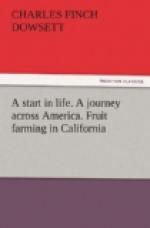It was nearly 5 o’clock before we got away, and the next day found us at Queenstown Harbour, where we lost considerable time in waiting for the mail. At length the mail, which was a heavy one, was safely on board, and off we went, head on to the Atlantic. During that night of the 23rd we experienced a heavy gale; big seas broke over the forecastle, and flooded the decks below, through the ventilators. The A.B.’s declined venturing on the forecastle to unship these great ventilators, and so the engines had to be slowed down, and the ship stopped; the ventilators were then unshipped, and we proceeded. The night was a bad one, and the next morning we had not got through it, and as a consequence the decks were like lagoons; but presently we had run through it, or it had run away from us, or had expended its energy, and we were in comparatively smooth waters, and had a comfortable run to New York. Nothing of particular interest occurred during the passage. I sought and found the old American settlers amongst the passengers, and obtained from them all the information I could of the country, and especially the State to which I was going. I read “General” Booth’s “Darkest England,” and wrote a review of it, which duly appeared in the “Land Roll.”
The “Etruria” is a fine ship. She has a commodious saloon, music and reading room, plenty of deck space for exercise, comfortable cabins, bath rooms, etc.
On the 29th we made Sandy Hook Lighthouse, which is about 20 miles from New York Dock, but we got in too late for the Custom-house officers to look at our baggage, so we lay all night in the harbour, and next morning commenced the tedious process of creeping up, yard by yard, into our berth at the dock. The run from Liverpool was thus:—Liverpool to Queenstown, on the 22nd and 23rd, 240 miles; 24th, at noon, 330 miles; 25th, 454; 26th, 462; 27th, 475; 28th, 480; 29th, 471; distance to Sandy Hook Lighthouse, 130 miles; so that the run totals up to 3,042, and with the 20 miles added, 3,062 miles.
I had been recommended by a passenger to go to the Hotel St. Stephen, 46 to 52, East Eleventh Street, New York, whence I drove in a cab perhaps a mile and a half, for which the cabman wanted 2 dollars (equal to 8s. 4d.); he got 1-1/2, which was half-a-dollar too much. Passengers should drive to their hotel, and then ask the proper fare before paying. New York has many large hotels—this is comparatively a small one. All the waiters are coloured men, and this seems pretty general throughout America.
I stayed over the 30th (Sunday) in New York, by which I secured a quiet day and an opportunity to attend Divine service. In my bedroom was a coil of stout Manilla rope screwed into the floor, near a window, so that an escape might be secured in the event of fire. The towels provided are a kind of compromise between a duster and a pocket handkerchief—rather disappointing to one accustomed to his “tub.” New York is great in tram-cars, worked by horses,




